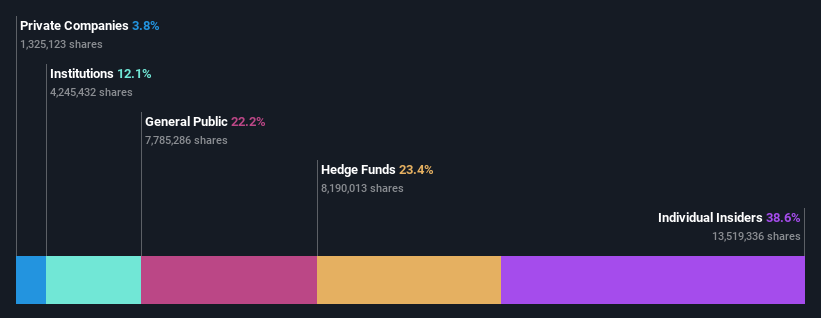RumbleON, Inc. (NASDAQ:RMBL) insiders have recently purchased stock and their bets paid off last week as company hit US$261m market cap
Key Insights
Significant insider control over RumbleON implies vested interests in company growth
A total of 3 investors have a majority stake in the company with 55% ownership
A look at the shareholders of RumbleON, Inc. (NASDAQ:RMBL) can tell us which group is most powerful. We can see that individual insiders own the lion's share in the company with 39% ownership. Put another way, the group faces the maximum upside potential (or downside risk).
Our data shows that insiders recently bought shares in the company and they were rewarded after market cap rose US$27m last week.
Let's delve deeper into each type of owner of RumbleON, beginning with the chart below.
Check out our latest analysis for RumbleON
What Does The Institutional Ownership Tell Us About RumbleON?
Institutions typically measure themselves against a benchmark when reporting to their own investors, so they often become more enthusiastic about a stock once it's included in a major index. We would expect most companies to have some institutions on the register, especially if they are growing.
RumbleON already has institutions on the share registry. Indeed, they own a respectable stake in the company. This suggests some credibility amongst professional investors. But we can't rely on that fact alone since institutions make bad investments sometimes, just like everyone does. It is not uncommon to see a big share price drop if two large institutional investors try to sell out of a stock at the same time. So it is worth checking the past earnings trajectory of RumbleON, (below). Of course, keep in mind that there are other factors to consider, too.
Our data indicates that hedge funds own 23% of RumbleON. That's interesting, because hedge funds can be quite active and activist. Many look for medium term catalysts that will drive the share price higher. Mark Tkach is currently the company's largest shareholder with 18% of shares outstanding. For context, the second largest shareholder holds about 18% of the shares outstanding, followed by an ownership of 18% by the third-largest shareholder. William Coulter, who is the third-largest shareholder, also happens to hold the title of Member of the Board of Directors.
A more detailed study of the shareholder registry showed us that 3 of the top shareholders have a considerable amount of ownership in the company, via their 55% stake.
While studying institutional ownership for a company can add value to your research, it is also a good practice to research analyst recommendations to get a deeper understand of a stock's expected performance. Quite a few analysts cover the stock, so you could look into forecast growth quite easily.
Insider Ownership Of RumbleON
While the precise definition of an insider can be subjective, almost everyone considers board members to be insiders. The company management answer to the board and the latter should represent the interests of shareholders. Notably, sometimes top-level managers are on the board themselves.
I generally consider insider ownership to be a good thing. However, on some occasions it makes it more difficult for other shareholders to hold the board accountable for decisions.
Our information suggests that insiders maintain a significant holding in RumbleON, Inc.. Insiders own US$100m worth of shares in the US$261m company. This may suggest that the founders still own a lot of shares. You can click here to see if they have been buying or selling.
General Public Ownership
The general public, who are usually individual investors, hold a 22% stake in RumbleON. While this group can't necessarily call the shots, it can certainly have a real influence on how the company is run.
Private Company Ownership
It seems that Private Companies own 3.8%, of the RumbleON stock. Private companies may be related parties. Sometimes insiders have an interest in a public company through a holding in a private company, rather than in their own capacity as an individual. While it's hard to draw any broad stroke conclusions, it is worth noting as an area for further research.
Next Steps:
While it is well worth considering the different groups that own a company, there are other factors that are even more important. Like risks, for instance. Every company has them, and we've spotted 2 warning signs for RumbleON (of which 1 shouldn't be ignored!) you should know about.
Ultimately the future is most important. You can access this free report on analyst forecasts for the company.
NB: Figures in this article are calculated using data from the last twelve months, which refer to the 12-month period ending on the last date of the month the financial statement is dated. This may not be consistent with full year annual report figures.
Have feedback on this article? Concerned about the content? Get in touch with us directly. Alternatively, email editorial-team (at) simplywallst.com.
This article by Simply Wall St is general in nature. We provide commentary based on historical data and analyst forecasts only using an unbiased methodology and our articles are not intended to be financial advice. It does not constitute a recommendation to buy or sell any stock, and does not take account of your objectives, or your financial situation. We aim to bring you long-term focused analysis driven by fundamental data. Note that our analysis may not factor in the latest price-sensitive company announcements or qualitative material. Simply Wall St has no position in any stocks mentioned.


